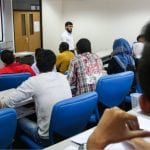The Treaty on the Prohibition of Nuclear Weapons: Historic Progress, Yet Not a Complete End to the Struggle
122 members of the United Nations, including Indonesia, voted in favor for the adoption of an international treaty eliminating the use of nuclear weapons, at the UN Conference to Negotiate a Legally Binding Instrument to Prohibit Nuclear Weapons on Friday (7/7).
The treaty, called the Treaty on the Prohibition of Nuclear Weapons, was finally adopted after last December, with an overwhelming majority of UN member states approving a resolution to begin negotiations. It is the first document after the end of World War II, that calls for the prohibition and dismantling of nuclear weapons.
Elayne Whyte Gomez, president of the UN conference, stated that, “The world has been waiting for this legal norm for 70 years,” after the first atomic bombs were deployed to target Hiroshima and Nagasaki in August 1945.
The negotiation for the treaty was scheduled last March and continued from the 15th of June to the 7th of July, with the participation of governments, international organizations, and civil representatives. 129 countries, which represent two-thirds of the total UN membership, were present at the conference to negotiate the substantive materials of the treaty.
Unlike the previous nuclear treaty, the Non Proliferation Treaty (NPT), this treaty sternly prohibits any nation to develop, test, produce, manufacture, otherwise acquire, possess or stockpile nuclear weapons or other nuclear explosive devices. According to Beatrice Fihn, executive director of the International Campaign to Abolish Nuclear Weapons, the treaty is a clear categorical prohibition of nuclear weapons, and is firmly rooted in humanitarian law.
With strong provisions enshrined in the treaty, a greater challenge awaits, as the adoption of the treaty does not necessarily mean that the struggle to eliminate the use of nuclear weapons has come to an end.
Indonesia’s Longstanding Interest on Denuclearization
Indonesia has a strong interest in nuclear disarmament, and this does not automatically come to an end after the adoption of the new Prohibition of Nuclear Weapons treaty.
Indonesia’s ambitions in denuclearization became increasingly visible between the 1970s and 1980s under President Soeharto’s leadership. Together with Malaysia, Indonesia proposed the establishment of a Southeast Asia Nuclear Weapon Free Zone (SEANWFZ). The idea was formally raised and presented at Jakarta’s ASEAN Foreign Ministers meeting in 1984.
For Indonesia, the enactment of the SEANWFZ, also known as the 1995 Bangkok Treaty, was a historic achievement. The Bangkok Treaty consists of two legally binding instruments; the main treaty and its protocol. The main treaty is aimed towards all States comprising the territories of Southeast Asia and the protocol is open to signatories of the Nuclear Weapon States (NWS), namely the People’s Republic of China, France, the Russian Federation, the United Kingdom and the United States of America.
In addition, It is aimed commit signatories to refrain themselves from undertaking nuclear weapon activity against any State party to the Treaty, and/or within the Southeast Asia Nuclear Weapon-Free Zone.
On 8-12 August 2011, for the first time ever, under Indonesia’s leadership, ASEAN officials met with representatives from the NWS to discuss the further accession and ratification of the Bangkok Treaty. Intensive negotiations with the NWS were continued at the 2011 ASEAN Summit, where ASEAN member states finally resolved substantive differences and concluded negotiations to enable the five NWS to accede to the Treaty.
At a later date, when the NWS met in Washington D.C. in the fall of 2016 as part of the UN Security Council meeting, they reaffirmed “their readiness to sign the protocol to the Southeast Asia Nuclear Weapon Free Zone [SEANWFZ] at the soonest possible time.” However, despite Indonesia’s reputable leadership in ASEAN, to this date, none of the NWS have become party to the treaty.
Indonesia and ASEAN: Post-International Nuclear Ban Treaty Adoption
The successful attempt made by the international community to create an international framework to abolish the use of nuclear weapons must not sway Indonesia and ASEAN’s effort to promote the accession of the NWS to the Bangkok Treaty.
Though the document was successfully adopted, ratification will only commence on September 19th, at the annual meeting of the General Assembly, and will be put into force 90 days after successful ratification from 50 countries.
Only the Netherlands voted ‘against’ the adoption of the international treaty eliminating the use of nuclear weapons. However, immediately after the treaty was adopted, the Permanent Representatives of the United States, United Kingdom, and France released a Joint Press Statement emphasizing that they have not taken part in the negotiation of the treaty and do not intend to sign, ratify, or become party to the treaty.
Their standpoint is clear: “There will be no change in the legal obligations of our countries with respect to nuclear weapons”, as mentioned in the Joint Press Statement.
With Indonesia currently drafting national legislation on ‘nuclear security’ to align the Bangkok treaty action plan with domestic policy, it is imperative that Indonesia continues its nuclear disarmament diplomacy efforts and negotiations at both the regional and international level. This would ensure that the NWS recognize the catastrophic humanitarian consequences of nuclear weapons.
The ASEAN executive committee met on the 25t May 2017 to review the progress of implementation and accession of the five NWS to the treaty. Furthermore, the recent adoption of a global treaty on the total elimination of nuclear weapons that will be opened for signatures in September, the 24th ASEAN Regional Forum (ARF), to be held in August 2017.
This combination is seen as a strategic platform to further discuss the progress of the SEANWFZ Plan of Action. In particular, Indonesia should encourage the 9th ARF Inter-Sessional Meeting on Non-Proliferation and Disarmament to be hosted during the ARF Ministerial Meeting, and take a leading role to further open discussion on the practical matters in regards to the accession of the NWS to the Bangkok Treaty.
*) Dio Herdiawan Tobing is the Research Manager of ASEAN Studies Center UGM. He will start his LLM in Public International Law at Leiden University in September.




